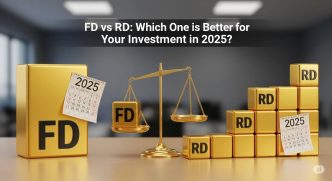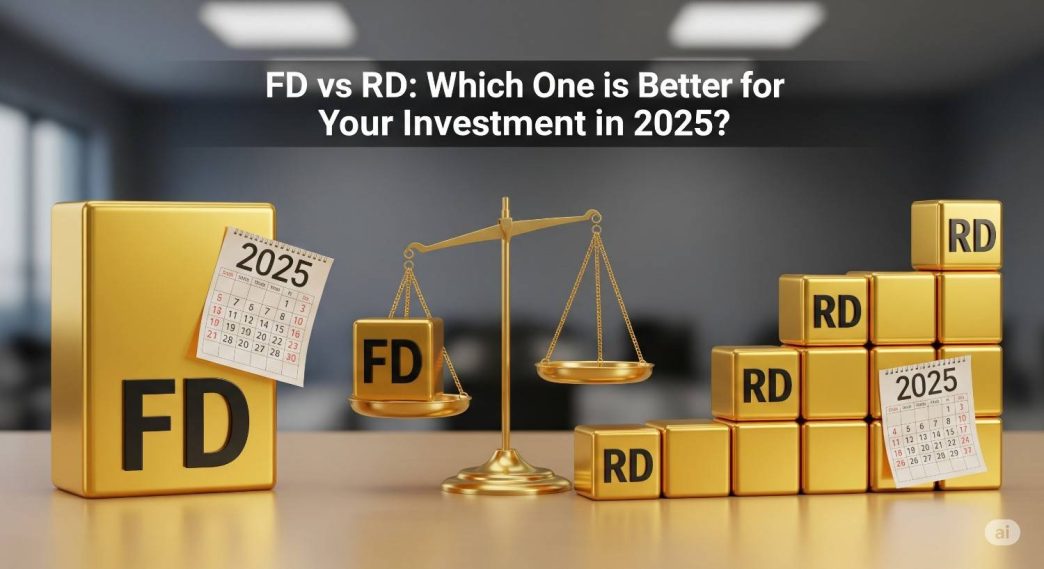Wondering whether Fixed Deposits (FD) or Recurring Deposits (RD) is better for your investment in 2025? FD vs RD Learn the key differences, benefits, and which one suits your financial goals.
Introduction
FD vs RD In India, Fixed Deposits (FD) and Recurring Deposits (RD) are two of the most popular traditional investment options. Both offer safety and guaranteed returns, but when it comes to choosing between them, the decision can be tough.In this article, we will compare FD vs RD, explaining their key differences, benefits, and how to decide which one is better for your investment goals in 2025.FD vs RD
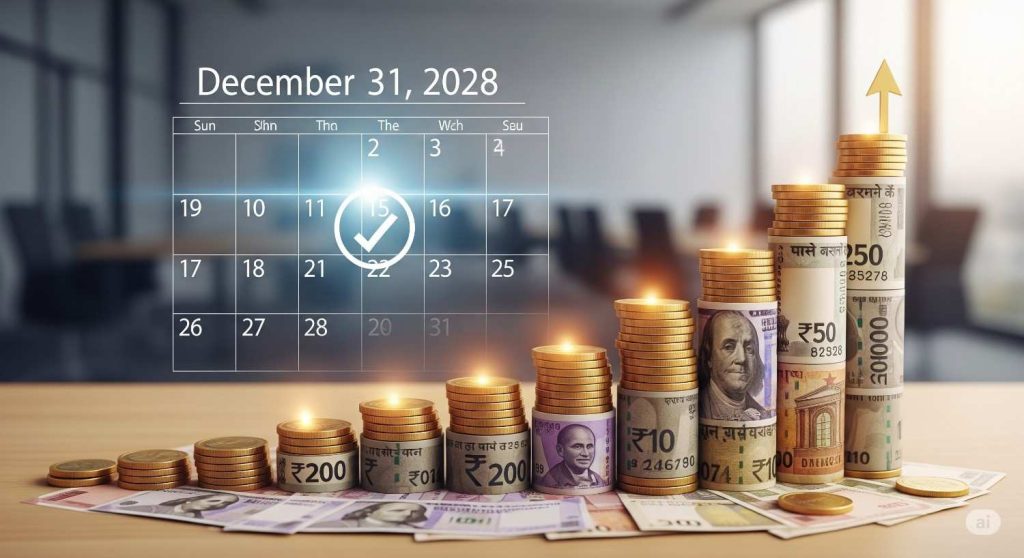
What is a Fixed Deposit (FD)?
A Fixed Deposit (FD) is a type of investment where you deposit a lump sum amount with a bank or financial institution for a fixed tenure at a predetermined interest rate. The amount stays locked for the specified period, and you earn interest on the principal sum.
Key Features of FD:
- Lump Sum Investment: You deposit a single amount for a fixed period.
- Interest Rate: Fixed and guaranteed.
- Tenure: Typically ranges from 7 days to 10 years.
- Liquidity: Low; penalties for premature withdrawal.
What is a Recurring Deposit (RD)?
A Recurring Deposit (RD) allows you to invest a fixed sum of money at regular intervals (usually monthly) for a fixed tenure. It is designed for those who cannot invest a lump sum amount but prefer to save regularly.
Key Features of RD:
- Regular Contributions: You invest a fixed amount monthly.
- Interest Rate: Fixed and guaranteed.
- Tenure: Usually ranges from 6 months to 10 years.
- Liquidity: Low; penalties for early withdrawal.
FD vs RD: Key Differences
| Feature | Fixed Deposit (FD) | Recurring Deposit (RD) |
|---|---|---|
| Investment Type | Lump sum deposit | Monthly fixed deposit |
| Interest Rate | Fixed rate for the entire term | Fixed rate for the entire term |
| Tenure | Flexible (7 days to 10 years) | Fixed (6 months to 10 years) |
| Liquidity | Low, with premature withdrawal penalties | Low, with premature withdrawal penalties |
| Risk Level | Very low, as the amount is guaranteed | Very low, with guaranteed returns |
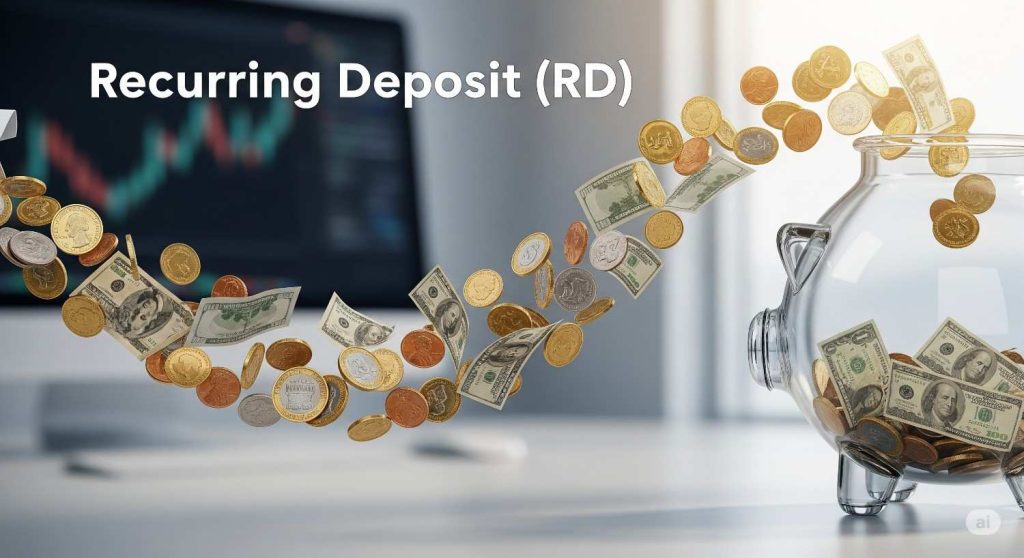
Benefits of Fixed Deposits (FD) in 2025
- Guaranteed Returns: FD offers fixed interest rates, making it a safe bet for conservative investors.
- Higher Interest Rates: Typically, FD offers a slightly higher interest rate compared to RD.
- Low Risk: Being a low-risk investment, FD guarantees your principal amount.
- Tax Benefits: Tax-saving Fixed Deposits qualify for deductions under Section 80C of the Income Tax Act.
Benefits of Recurring Deposits (RD) in 2025
- Systematic Investment: RD is ideal for individuals who cannot invest a large sum of money at once but prefer regular contributions.
- Discipline in Saving: Since the amount is deducted automatically each month, it helps build a disciplined savings habit.
- Guaranteed Returns: Like FD vs RD offers fixed interest and guaranteed returns.
- Accessibility: Since RDs are more flexible with contributions, they are suited for middle-class families aiming to build savings without a lump sum investment.
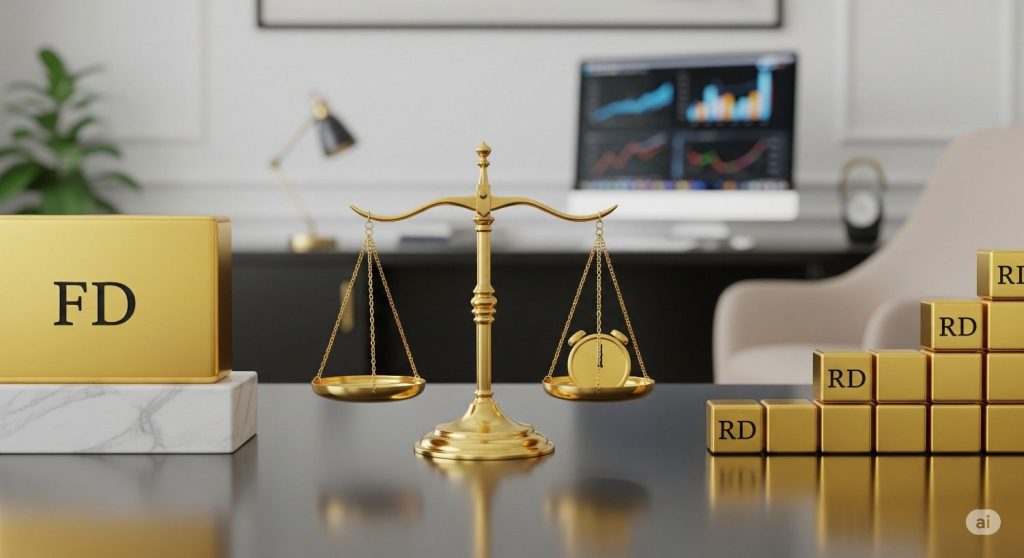
FD vs RD: Which One is Better
Now that we’ve looked at the key features and benefits of both FD vs RD, it’s time to figure out which one works best for your investment goals. The answer depends on your financial needs and the nature of your savings plan.
Choose Fixed Deposit (FD) If:
- You have a lump sum amount ready to invest.
- You want higher returns over the long term.
- You are looking for a safe, low-risk investment option.
- You do not require regular access to the invested amount.
Choose Recurring Deposit (RD) If:
- You can save only a fixed amount every month.
- You prefer a disciplined savings plan with guaranteed returns.
- You are looking for a risk-free investment but cannot afford a large lump sum.
- You have mid-term financial goals (1 to 5 years).
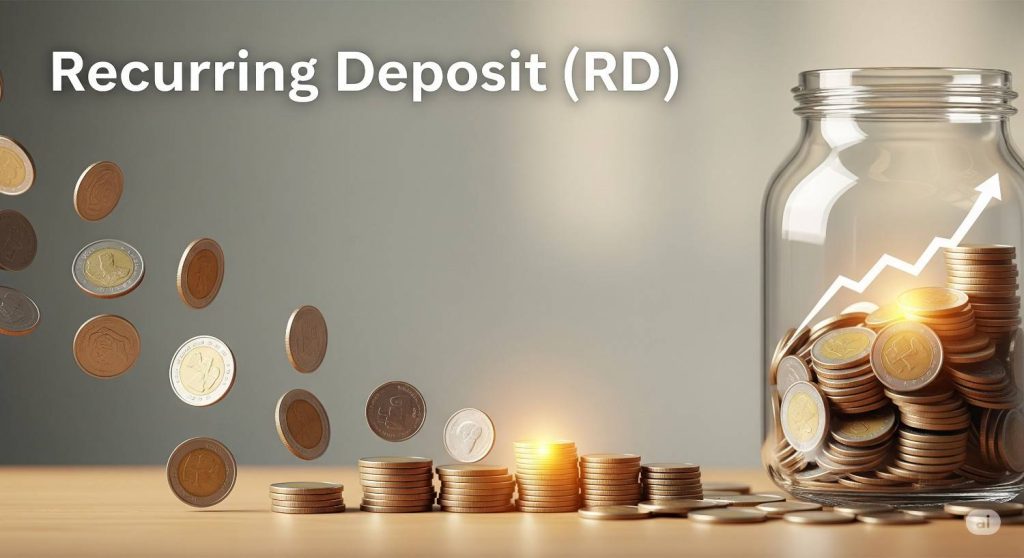
Which is More Beneficial for Tax Savings?
Both FD and RD offer tax benefits under Section 80C, but Tax-Saving Fixed Deposits offer additional tax deductions. If you’re looking for tax-saving options, FD is a better choice.
FAQs: FD vs RD
1. Which is better: FD or RD?
It depends on your saving capacity. If you can invest a lump sum amount, FD might be better. If you prefer monthly savings, RD is ideal.
2. Can I withdraw my FD or RD early?
Yes, but both have penalties for premature withdrawals. FD penalties are often higher.
3. What is the interest rate for FD and RD in 2025?
FD rates typically range from 5% to 7%, while RD rates are similar but may slightly vary based on the bank.
4. Are FD and RD safe investments?
Yes, both FD and RD are safe, low-risk investments with guaranteed returns.
5. Can I take a loan against FD or RD?
Yes, you can take a loan against FD, but loans against RD are not commonly available.
Conclusion
Both FD vs RD are excellent traditional investment options with guaranteed returns and low risk. The key is to match the right option with your financial goals and saving capacity.
- If you have a lump sum amount to invest and seek better returns, FD might be the right choice for you.
- If you prefer saving a fixed amount each month with the same guaranteed returns, RD would be more suitable.
Both FD vs RD investments provide peace of mind with guaranteed returns, but the decision ultimately depends on your investment style and needs. Choose wisely to make your savings work for you in 2025!
Know more related:
Best Cashback Credit Cards India 2025
